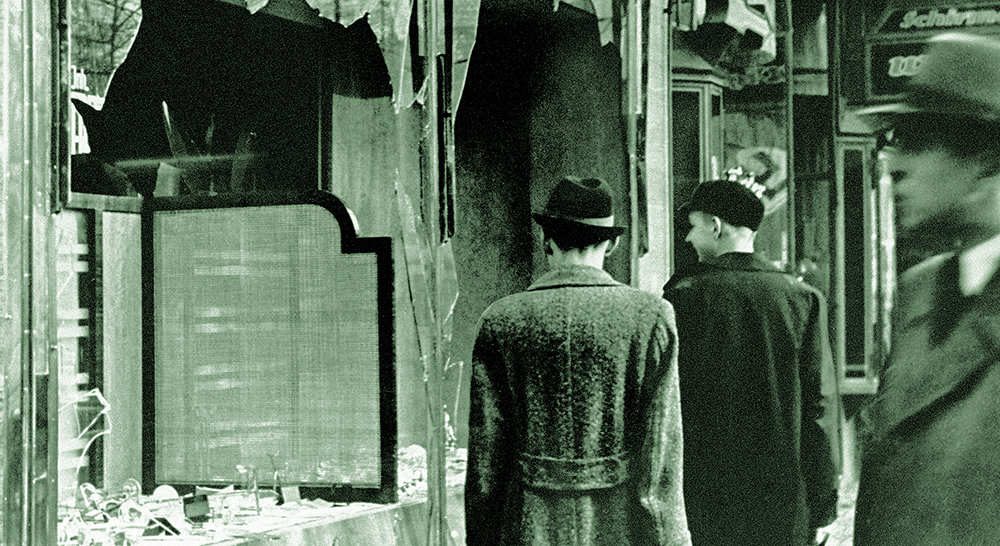
Testimonies that were read on the night of remembrance
Margot Lemle z’l
During that terrible night of November 9th, we were very tense with the news about what was happening. We knew that my husband, like all the Jews of Frankfurt, was in great danger. When the doorbell rang at 7am the next morning, we were shocked: two SS men, in civilian clothes, with weapons in hand, came in shouting: “Get ready, quickly! You will only be able to take one suitcase of clothes!” They searched the entire apartment. Alfred, sitting on his bed, asked: “Did you bring me a present?” One of the Nazis, who seemed a little more human, said to me in a low voice: “I’m so sorry!”
Ernesto Bach z’l
I can’t say exactly how it got to Kristallnacht. I had been outside of Berlin. For a few months I was apprenticed to a practical trade in a small town in Saxony. As everyone thought that most Germans were only academics, I went to learn something, to work on a loom. But the factory, which belonged to Jews known to my mother, had to be Aryanized too, and, a few days before the Night of Broken Glass, I had returned to Berlin. The police looked for the men and knew where to find them, because everyone, not just Jews, had to register with the police. And they knew where there were Jewish men. So, when the afternoon arrived, you saw men on the street walking with backpacks and blankets, going to some house where only women lived, to sleep there, because they wouldn’t be searched there. I did that too. I hadn’t registered back in Berlin yet, so the police didn’t know I was there. But that night, I remember it very well: I went to the street and saw people breaking windows, I saw the synagogue on fire. I didn’t really want to draw attention. They had previously acted with incredible evil: they ordered all the Jews, the store owners, to paint the owner’s name in large letters on the window. So, everyone already knew where to break the windows.
Josef Aronsohn z’l
We had a store and everything, until that day. They broke the store, broke the big windows in the store. City people, popular people, rascals. The next day, November 10th, I went, as usual, to Gleiwitz, for classes at the Cantor’s Seminar. When I came back, they arrested me. They arrested all the Jews: they took us to the concentration camp in Buchenwald. I stayed there six weeks, until December 16th. I was treated very badly. They injured me with a shotgun in my left hand. I couldn’t write anything after being there. Then I wrote with my right hand, with help. It was very difficult. After two or three weeks, we were allowed to write a letter home. The letter was pre-formulated: “I’m in the concentration camp, I feel fine, I’m missing nothing.” All with the same text. When this letter arrived at home, my grandfather, my mother’s father, who lived with them, said: “Rosa, why are you crying? You see, he has everything. He’s doing well, isn’t he?” I was only released after I signed an order that I was going to leave Germany. I thought, “I’m going to organize an opportunity to emigrate.” But when I returned from the concentration camp, I was immediately offered a job as a cantor in Gleiwitz. I accepted and then I got married.
Hans Wilmersdorfer z’l
At night they broke up all the Jewish stores. Munich’s two synagogues have disappeared. The Orthodox synagogue, that night, was set on fire. The other synagogue had already been torn down before, to make a square. They also invaded Jewish homes and beat them. But that was the start of an obvious chase. Before, they had already banned Jews from practicing Medicine and Law. The theaters were already closed to us. In 1938, I realized and so did my father that it was the end. And we had to leave as quickly as possible, if there was still a possibility. If it hadn’t been for Mom, Dad wouldn’t have left Germany. He couldn’t imagine it would get to this point.
I was arrested in the store we still had. The police took me to the police station and then we went by truck to Dachau. Dad was stupid enough to go to the police station to look for me and take a suitcase with clothes. Naturally, I couldn’t take clothes at all. And dad, on that occasion, was also arrested. Although he was in his early 60s and only Jews up to the age of sixty were arrested.
This Kristallnacht was not a spontaneous event. Everything was already prepared. Because the barracks for us were ready in Dachau. I estimate that we were around eight to nine thousand. A huge, big camp. Every day, one or the other died. More due to illness, more due to stress than because of brutality, which we also had. Little food. Very little food. And a stupid regime. Just to torture us. The German people knew about concentration camps, of course!